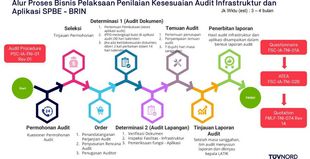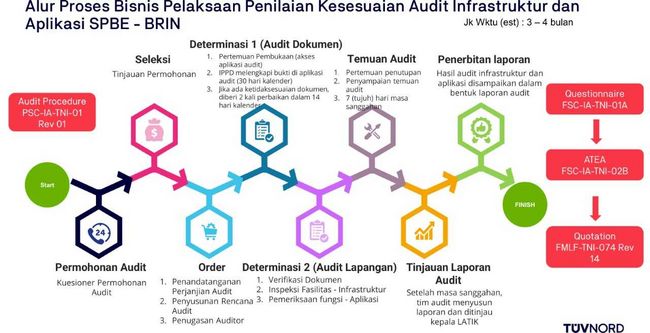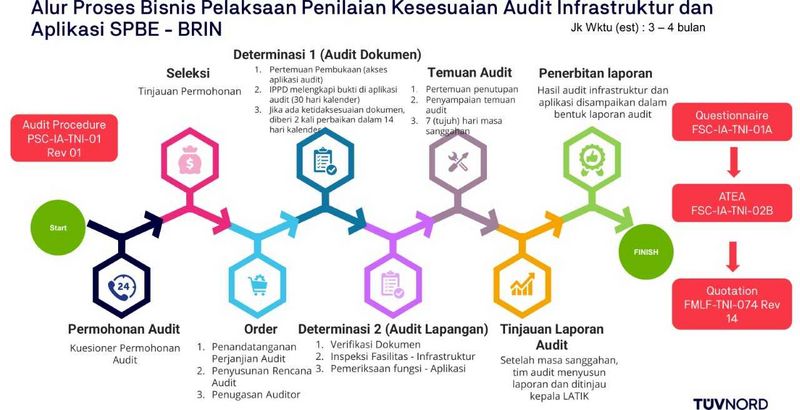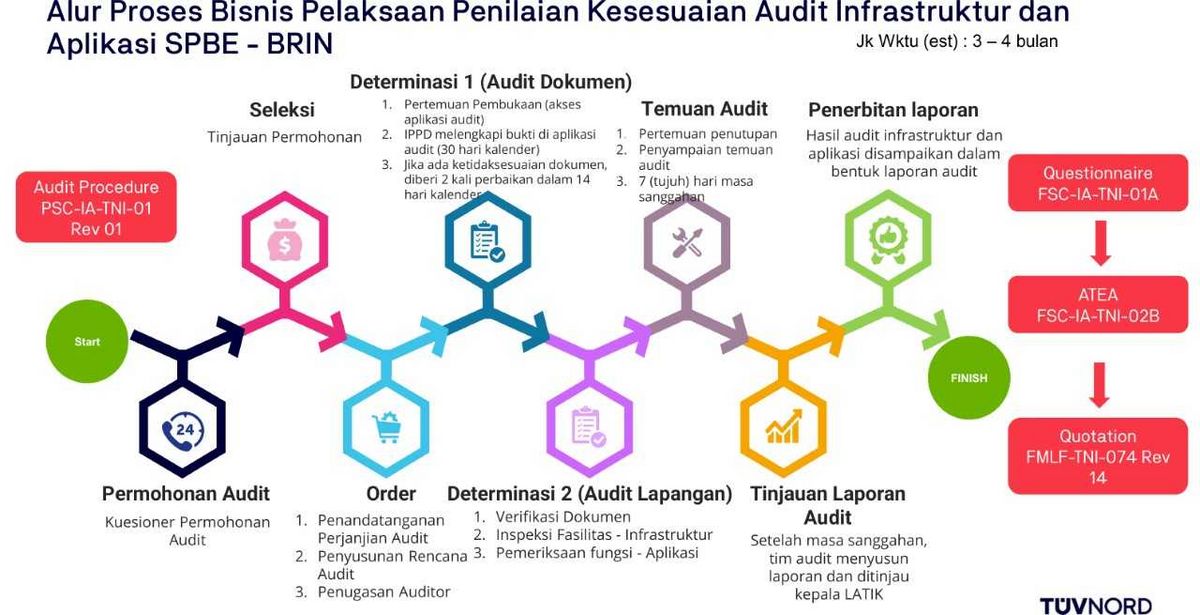Information and Communication Technology (ICT) Audit for Better Digital Governance
In alignment with President Prabowo Subianto’s vision emphasizing the acceleration of digital transformation in public services, Information and Communication Technology (ICT) audits have become a critical element to ensure that government digital systems operate effectively, efficiently, and purposefully. The current administration promotes inclusive and sustainable digitalization across all public service sectors, emphasizing transparency, efficiency, and accountability as core pillars.
One of the government’s digital platforms is the Electronic-Based Government System (SPBE), implemented by both central and regional government institutions. In this context, the ICT Audit Institution (LATIK) plays a strategic role in assessing the performance of digitalization initiatives in public institutions and providing recommendations based on national standards to support rapid and impactful digital bureaucratic reform.
PT TÜV NORD Indonesia, as an accredited ICT Audit Institution (LATIK) by the National Accreditation Committee (KAN) and registered with the National Research and Innovation Agency (BRIN) through the LATIK Information System (SiLATIK), offers professional, objective, and reliable SPBE audit services—particularly for application and infrastructure scopes. The presence of LATIK is regulated under BRIN Regulation No. 1 of 2024, forming part of a strategic policy to enhance ICT governance within central and local government agencies.
The SiLATIK system is designed to ensure that the accreditation and registration processes for audit institutions are transparent, accountable, and structured, as outlined in official BRIN publications. Through this system, BRIN ensures that only high-quality and competent institutions, in accordance with national standards, are authorized to audit the implementation of SPBE. This supports the national digital transformation agenda as mandated by Presidential Regulation No. 95 of 2018 on SPBE and is further backed by the Ministry of Administrative and Bureaucratic Reform (PANRB) and the Ministry of Communication and Digital (Komdigi).
Scope of SPBE Audit Services
The scope of external SPBE audits by accredited and registered LATIK institutions includes the following: Technical standards for SPBE application audits cover: 1. SPBE Application Governance 2. SPBE Application Management
3. SPBE Application Functionality
4. SPBE Application Performance
5. Other SPBE Aspects The technical standards for infrastructure and application audits are based on the Head of BRIN Decree No. 161/I/HK/2024 concerning Evaluation Criteria for SPBE Infrastructure and Application Audits. The SPBE infrastructure audit includes:
|
Who is Eligible for External SPBE Audits by LATIK?
External SPBE audits conducted by LATIK, including those by PT TÜV NORD Indonesia, are targeted at:
- Central Government Institutions including ministries, non-ministerial government agencies, secretariats of state and non-structural institutions, and other public agencies.
- Regional Governments at the provincial, regency, and city levels that implement electronic-based governance systems.
Audits may be initiated upon request or assignment from relevant institutions or regulators. The objective is to evaluate, assess, and recommend improvements to SPBE implementation.
External SPBE audits conducted by LATIK, including those by PT TÜV NORD Indonesia, are targeted at:
- Central Government Institutions including ministries, non-ministerial government agencies, secretariats of state and non-structural institutions, and other public agencies.
- Regional Governments at the provincial, regency, and city levels that implement electronic-based governance systems.
Audits may be initiated upon request or assignment from relevant institutions or regulators. The objective is to evaluate, assess, and recommend improvements to SPBE implementation.
Regulatory Framework Underpinning LATIK SPBE Audits
SPBE audits by PT TÜV NORD Indonesia are conducted based on the following national regulations and policies:
These regulations serve as a robust foundation for both internal and external SPBE audits, ensuring audit quality, valid recommendations, and the legitimacy of audit institutions in the national SPBE framework. |
Why Choose SPBE Audit Services by PT TÜV NORD Indonesia?
Proven and Accredited Competence As an officially recognized LATIK, we have undergone rigorous accreditation and registration processes, ensuring our audits are conducted with integrity, high standards, and full compliance with government regulations.
Regulatory Compliance Support Our SPBE audits follow Presidential Regulation No. 95/2018, Kominfo Regulation No. 16/2022, and BRIN Regulation No. 1/2024, helping institutions ensure that SPBE implementation is effective and compliant.
Enhanced Government Transparency and Efficiency External SPBE audits enable both central and regional institutions to assess the readiness and effectiveness of their digital services, forming the basis for continuous improvement toward more citizen-centric public services.
Professional and Experienced Team Supported by certified and experienced auditors in ICT and digital governance, we deliver a risk-based, comprehensive audit approach that focuses on improving the quality, performance, and security of applications and infrastructure. Our auditors meet technical competence standards through BRIN-accredited training and hold professional certifications such as SKKNI ATI and CISA. |
Strategic Benefits of SPBE Audits by PT TÜV NORD Indonesia
Based on Kominfo Regulation No. 16/2022 and BRIN Regulation No. 1/2024, SPBE audits provide strategic benefits to central and regional institutions, including:
- Obtaining and evaluating objective evidence related to ICT assets;
- Enhancing performance, assessing compliance with technical standards and regulations, and mitigating risks associated with technology use;
- Determining the level of conformity of ICT with established criteria and applicable laws and regulations.
SPBE External Audit Procedures by PT TÜV NORD Indonesia




FAQs on IT Audit
- What should institutions prepare for an SPBE External Audit by LATIK (PT TÜV NORD Indonesia)?Institutions must complete the Audit Request Form provided by PT TÜV NORD Indonesia, including:
- Name and address of the government institution (central or regional), along with the name and position of the SPBE Coordinator;
- Scope of the Infrastructure and/or Application SPBE Audit;
- Fulfillment of requirements based on applicable regulations, including:
- SPBE Master Plan;
- Institutional SPBE Architecture;
- SPBE Roadmap;
- Internal SPBE Audit Report within the past year.
- What audit tools are used during the SPBE External Audit process?
LATIK and the audited institution (auditee) will use audit tools provided by BRIN. All audit documentation and activities are recorded within these tools. Auditees are required to upload supporting evidence for each audit criterion according to the audited scope.